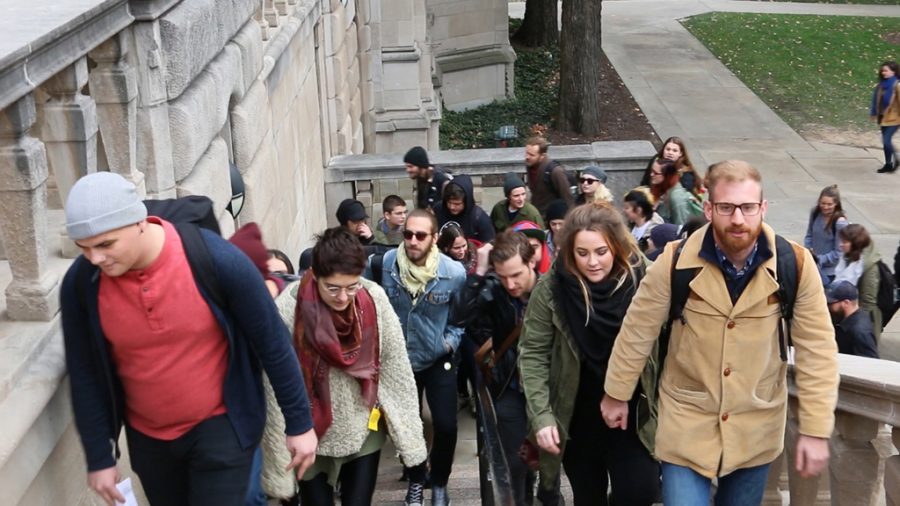With the potential passage of an anti-sanctuary bill looming, the state and some Pennsylvania universities are at odds.
But Pitt — where a sanctuary campus petition and a letter in the same vein have been circulating for weeks — has remained silent on the issue, making it unclear if a bill currently sitting in the state House would affect the University’s funding.
The Pennsylvania Senate passed a bill — then called SB 10 and sponsored by Sen. Guy Reschenthaler — on Feb. 7 that would withhold funding from municipalities and counties that do not cooperate with federal immigration authorities. The bill, now called HB 14, is currently in the House, which will not be in session until March 13. A vote for HB14 is not yet listed on the House’s calendar, which goes up to March 16.
“This is a controversial issue, but the bill is simple,” said the bill’s sponsor, Rep. Jerry Knowles, in a January Facebook post. “Institutions that comply with federal law will receive state funding as normal. Those who decide not to follow the law would not receive state funding. We cannot select which laws we want to follow and obey and which laws we want to ignore and break.”
The only two self-declared sanctuary campuses in Pennsylvania are the University of Pennsylvania in Philadelphia and Swarthmore College in Swarthmore, Pennsylvania. The colleges are private institutions, so state funding is an issue there as it would be at any of Pennsylvania’s state or state-related universities, including Pitt, Pennsylvania State University, Temple University and Lincoln University.
Penn State’s president is the only to have outrightly decided against the label. Instead, the bill is a preemptive act, discouraging other public universities from becoming sanctuary campuses by threatening their federal funds. Gov. Tom Wolf requested roughly $147 million of the commonwealth’s 2017-18 budget go toward Pitt — about $2 million more than was allotted to the University in last year’s budget. State funds make up about 7 percent of the University’s total budget.
It’s so far unclear whether Pitt will heed that warning. Chancellor Patrick Gallagher has toed the line in declaring Pitt a sanctuary campus despite pushes from the community to do so.
Nine Pitt faculty members drafted a petition asking Chancellor Gallagher and Provost Patricia Beeson to declare Pitt a sanctuary campus in early December. Peter Campbell, an assistant English professor, helped spearhead the effort with English professor Sarah Leavens — as of Feb. 9, the online petition has nearly 620 signatures.
In an email sent to all petition signees, Campbell said the authors plan to submit the petition to the Chancellor and Provost on Monday, Feb. 13.
Along with pushing paper, Pitt students and Pittsburghers have taken to the streets to voice their support of Pitt and the city remaining a welcoming place for refugees and immigrants.
In November, 300 people marched from the Cathedral to the South Side to protest Trump’s anti-immigration policies. Protesters gathered at the Pittsburgh International airport Jan. 30 to decry what many — including the president himself at one point — have called a ban on Muslims. The President has since said the ban is targeted at preventing terrorism.
Pitt students also gave Vice Chancellor Kathy Humphrey a letter in November asking to make Pitt a safe space for undocumented students. The letter was part of a nationally organized campaign — National Walk-Outs for #SanctuaryCampus — where roughly 55 students gathered to demonstrate.
The petitions and letter drops are meant to garner a direct response from the University. In December, Campbell requested that if the Chancellor was not going to explicitly use the word “sanctuary,” he at least acknowledge the letter and petition’s request.
Gallagher sent out a note in support of Pitt’s international students the day Trump’s ban took effect, but he has not issued a response to the petition or to the letter. A spokesperson for Gallagher, Susan Rogers, has not responded to several requests for comment on the issue.
Paul Johnson, an assistant professor in the department of communication, said Thursday that Pitt should take all the necessary steps to support refugee and immigrant students, regardless if it becomes a sanctuary city or not.
“HB 14 represents an attempt to coerce universities into violating human rights by tying a willingness to deport individuals to funding for that institution,” he said in an email.
If the bill passes the House, it would be up to the discretion of Gov. Tom Wolf on whether it becomes law. J.J. Abbott, Wolf’s press secretary, said the governor is still reviewing the bill. Wolf does have the power to veto whole legislative measures.
While students push their universities to take a stand, and Pitt remains silent, the state legislature isn’t budging.
“If a college or university that receives state taxpayer funding adopts a policy that is intended to thwart or circumvent the proper enforcement of federal law, then the state government has not only the right but the duty to withhold further funding until such time as the policy is revoked,” Rep. Stephen Bloom, who is one of HB14’s sponsors, said in an email Thursday.



